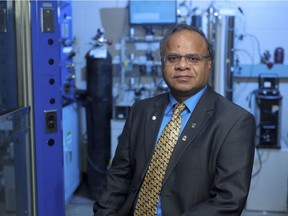U of S research seeks to convert agriculture, forestry leftovers into fuel
Natural gas from plant matter is seen as less harmful to the environment because it's made from material that naturally emits methane as it decays.

Article content
Tonnes of biomass from Saskatchewan’s farming and forestry sectors are left to decay naturally each year. Dr. Ajay Dalai, a professor at the University of Saskatchewan’s College of Engineering, is working with Calgary-based company Tidewater Renewables on a three-year project looking at ways to convert it into methane.
The resulting product, known as renewable natural gas or biomethane, is identical to the methane in natural gas used for generating heat and power. He spoke to Postmedia News about his work.
Q: Why would we want to make methane out of biomass when we know methane is one of the worst contributors to climate change?
A: What happens when we have bioresidue either from forestry or from agriculture, we store that carbon and then carbon eventually degrades to produce methane, and that methane has 21 times more greenhouse gas effect than carbon dioxide. So if we harvest that carbon as biomethane and utilize it, we not only utilize that for energy but also prevent it to rot and produce the natural methane that is emitted by itself. So why not take that solid carbon, produce biomethane, utilize that for energy and then emit it as CO2?
And when you burn biomethane, for example at a power plant, then it produces carbon dioxide that can be captured more easily and, I think, can be stored underground if necessary. There are ways to use that carbon dioxide — making some chemicals, for example — rather than letting the biomass rot on its own and produce methane that has no value to anyone but also creates a problem for the environment.
Q: What’s the goal of your project?
A: I think the economics really dictates which way the industry goes. I think the goal here is to provide a technology that can compete with the natural gas processing industry to see if it makes sense to increase the biomethane into that (natural gas) network. So, I think the economics will dictate, the technology will dictate (the industry) and that’s where our focus is: what we can do to compete with natural gas and get biomethane from the biomass that we have on the ground?
Advertisement 3
Article content
Q: If all goes well, how long do you think it would take for a biomethane industry to form here?
No matter what technology we develop, it has to be scaled up in a pilot plant to generate more reliable data that is needed for further scaling up in industry. So there are a few steps in between.
We’re looking at about three years to generate some meaningful data and make reasonable recommendations for industry to take it and make a pilot plant, and then look at the economics at that point and then move forward. So, I think we’re looking at at least five to 10 years down the road that something may come up with this industry.
I think for an industry to exist, or to take data from a lab and make money, it typically takes five to 10 years. So I think that’s what timeline we’re looking at.
No comments:
Post a Comment